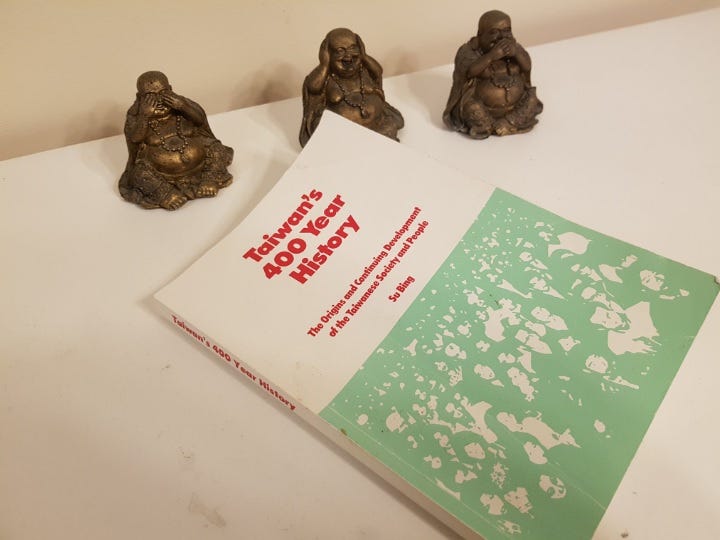The truth about Taiwan
Canada's One China policy is not rooted in the true history of the island nation
Canada doesn’t have a “One Russia” policy that endorses the subjugation of Ukrainian national identity. Nor does this country have a “One Israel” policy that supports the obliteration of Palestinian identity in the Israeli-occupied West Bank.
So why on Earth would we maintain a One China policy that utterly ignores the national aspirations of the Taiwanese people? Like the Ukrainians, Taiwanese people have their own flag, currency, constitution, elected legislature and president, armed forces, and health-care system.
Moreover, Taiwan’s human-rights policies correspond to those embraced by the United Nations.
The One China policy all comes down to money. Canadian trade with China, which has the second-largest economy in the world, dwarfs trade with Russia, so Canada maintains this inconsistency.
In the past when I’ve questioned Canada’s One China policy, I’ve been criticized for pushing us further down the path to a second Cold War. But let’s get real—there is already a Cold War, which was exacerbated by Russia’s invasion of Ukraine in violation of international law.
Meanwhile, Chinese president Xi Jinping refuses to renounce the use of force in achieving his objective of crushing Taiwanese democracy and making the island nation another province of China.
For those in power, it’s okay for the Canadian government to slam Russia for attacking Ukraine while giving China freedom to absurdly insist that Taiwan should be renamed “Chinese Taipei”.
I only came to question the One China policy after reading a book by Taiwanese nationalist Su Beng (sometimes referred to as Su Bing). In Taiwan’s 400 Year History, he documents waves of colonization by the Dutch, Spanish, Ming and Qing dynasties, and Japan. It had a particularly devastating impact on the island’s Indigenous tribes.
During the Qing dynasty, scholar Liu Liang-P’I described Taiwan as “a wilderness land and, from the beginning, never a part of Chinese domain”. Su Beng cites this passage from Liu’s Official Historical Record of Taiwan Vol II in the 1986 English translation of Taiwan’s 400 Year History.
“The immigrants and pioneers were the essential elements that brought about the creation and development of Taiwanese society and the Taiwanese people,” Su Beng writes. “But the Ming and Ch’ing [Qing] authorities looked upon them as ‘traitors,’ ‘bandits,’ or ‘hoodlums,’ and adopted a strict policy of refusing to let the Han people of southern China cross over to Taiwan. The lands opened by the immigrant pioneers were disparagingly called ‘secretly opened’ or ‘bandit opened’ lands, and the regulations were strictly applied.”
In another text called An Unofficial Record of Taiwan, Vol. II, scholar Chang Ju-shen described Taiwan as “a place where pirates band together”. Yet another text, Record of Taiwan, mentioned in the preface that the island was “in general, a haven for criminals who had escaped”.
Su Beng noted that people from Taiwan were prohibited from immigrating to China until 1875. Twenty years later, control over the island was transferred to Japan following the first Sino-Japanese war.
Japan colonized Taiwan for the following 50 years, building railways, imposing the Japanese language, taking control of major industries such as the sugar trade, and bringing western artforms to the island.
After the Second World War, China reasserted control, most notably through a 1947 massacre known as the February 28 incident. Chinese nationalist leader Chiang Kai-shek and two million of his followers moved to Taiwan two years later and imposed martial law following their defeat in the Chinese Civil War.
“After fleeing to Taiwan, Chiang K’ai-shek immediately took two important steps,” Su Beng writes. “One was to reorganize his secret agent organization. The other was to place control of the newly reorganized system in the hands of his son, Chiang Ching-kuo.
“He had established early control over the secret agents, the army, the party, and the youth,” the author continues. “Step by step, the foundation for a hereditary transition of power was established.”
It took 40 years of tremendous struggle for the Taiwanese people to achieve the end of martial law in 1989. They won full freedom of speech in 1992 and held their first democratic presidential election in 1996. These were critical steps on the path to creating their own national identity—which is rooted in the desire for freedom—that Xi Jinping wants to eliminate.
The word kowtow originated as a noun, according to Merriam-Webster. It referred to “the act of kneeling and touching one’s head to the ground as a salute or act of worship to a revered authority”.
“In traditional China this ritual was performed by commoners making requests to the local magistrate, by the emperor to the shrine of Confucius, or by foreign representatives appearing before the emperor to establish trade relations,” the dictionary states.
Nowadays in pursuit of trade relations, Canada kowtows to the Sinofascist modern emperor, Xi Jinping. This is taking place as Xi asserts imperialist hegemony over an island that his predecessors in the Ming and Qing dynasties never believed was part of the Chinese domain.
It’s time for the world to acknowledge that this current emperor has no clothes when he talks about Taiwan being inseparable from his country.



